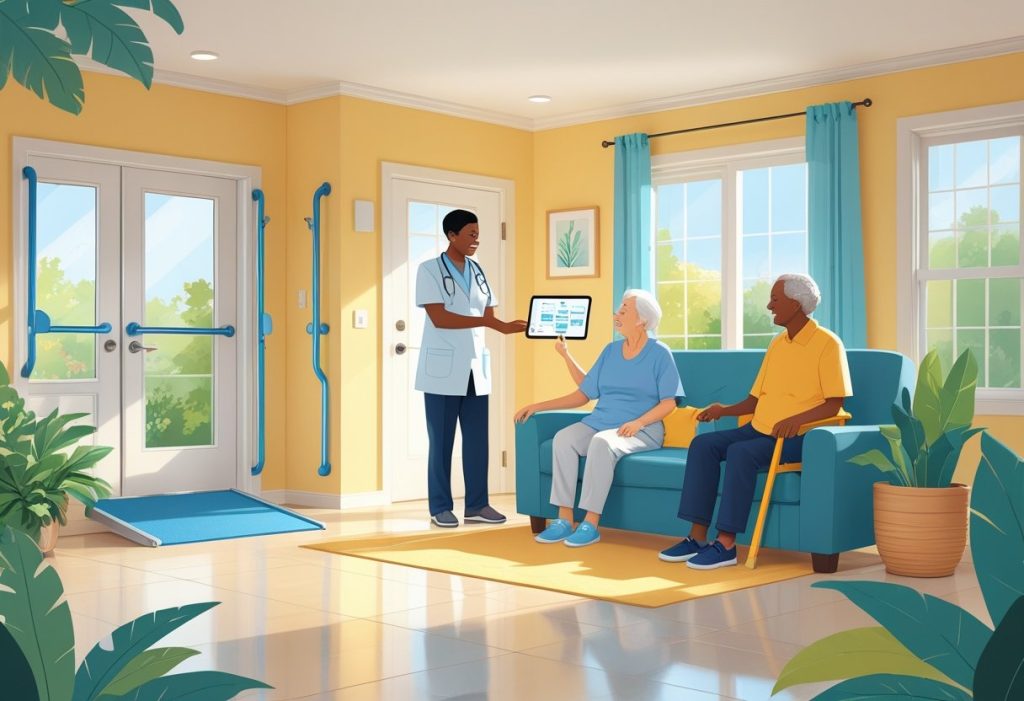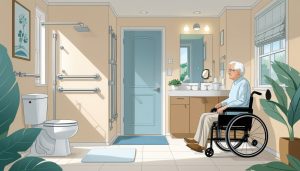Home modifications can be essential for maintaining independence as you age. Many seniors wonder whether Medicare offers support for these necessary changes. Medicare itself does not commonly cover home modifications, but understanding your options can help you navigate possibilities for financial assistance.
At The Modern Medicare Agency, we specialize in connecting you with Medicare plans that suit your individual needs, ensuring you get the most out of your coverage. Our licensed agents are real people who will work with you one-on-one to identify the best Medicare packages without hidden fees. This personalized service allows you to focus on your health and well-being while we handle the complexities of Medicare.
Explore how you can enhance your living space to ensure safety and comfort. Understanding the nuances of your Medicare benefits is crucial, and with the right guidance, you can make the most of what’s available to you.
Understanding Home Modification Medicare Coverage
Navigating Medicare coverage for home modifications requires understanding the available options and their limitations. The distinction between Medicare, Medicaid, and Medicare Advantage plans can significantly impact your choices and expenses.
What Is Medicare and Its Role in Home Modifications
Medicare is a federal health insurance program primarily for individuals aged 65 and older. It provides coverage for various health-related services, but when it comes to home modifications, its support is limited.
Generally, Medicare does not cover home modifications such as ramps or widened doorways, even if prescribed by a doctor. These modifications fall outside the durable medical equipment (DME) benefit, meaning you are responsible for the full cost.
However, discussing any potential assistance with your healthcare provider is crucial as they may have recommendations for alternative funding sources or programs that can aid in your situation.
Categories of Home Modifications Eligible for Coverage
While Medicare itself doesn’t provide coverage for home modifications, other programs like Medicaid might offer assistance. Typically, home modifications fall under specific categories that may be eligible for assistance, including:
- Safety improvements: Grab bars or non-slip surfaces.
- Accessibility upgrades: Widening doorways or adding ramps.
- Assistive devices: Items like portable bath aids or specialized beds.
Each state’s Medicaid program has different guidelines. Therefore, it’s essential to check your local regulations or consult with an expert to identify any potential financial support that may apply to your modifications.
Key Differences: Medicare, Medicaid, and Medicare Advantage
Understanding the differences among these programs is vital when exploring coverage for home modifications.
- Medicare provides limited coverage for medical services but does not typically cover home modifications.
- Medicaid may cover certain modifications based on financial eligibility and state guidelines.
- Medicare Advantage plans might offer added benefits, including possible coverage for home modifications; however, this varies by provider.
For personalized assistance, consider The Modern Medicare Agency. Our licensed agents offer one-on-one consultations to help you identify Medicare packages that align with your needs. You can trust our expertise to guide you through the complexities of Medicare without hidden fees.
Eligibility and Approval for Home Modification Benefits
Understanding the criteria, necessary assessments, and the approval process is crucial for accessing home modification benefits under Medicare. Knowing these factors can help you navigate the system effectively.
Eligibility Criteria and Requirements
To qualify for home modification benefits, you must meet specific eligibility criteria set by Medicare. Typically, you should be enrolled in Medicare, specifically under Medicare Advantage plans, as Original Medicare generally does not cover home modifications.
You must also demonstrate a medical need based on a qualifying condition. Common conditions include mobility impairments or chronic illnesses that hinder daily activities.
Additionally, your living situation must warrant modifications, such as the need for grab bars, ramps, or wider doorways to accommodate mobility aids. The inclusion of a therapy plan of care from a healthcare provider can further support your case.
Medical Necessity and Functional Assessments
Establishing medical necessity involves a detailed functional assessment of your limitations. This assessment is often conducted by healthcare professionals who evaluate your ability to perform daily tasks.
You need to provide documentation that outlines how certain modifications will enhance your safety and independence. This may include assessments from physical or occupational therapists who can advocate for specific modifications based on your needs.
The therapy plan should clearly outline the necessity of each modification, linking them to your medical conditions. This documentation is critical in demonstrating that the requested changes are essential for your health and well-being.
Approval Process and Documentation Needed
The approval process for home modifications requires thorough documentation to justify your request. Once you have your functional assessment, you’ll need to submit it alongside a detailed letter of medical necessity.
Your application must include any relevant treatment plans and a list of recommended modifications. It’s advisable to work closely with your healthcare provider to ensure that all information aligns with Medicare’s coverage criteria.
You may also need to submit additional documentation if requested, which could include X-rays or other imaging results that substantiate your condition. Having accurate and complete documentation can significantly impact the approval outcome.
For personalized assistance in navigating Medicare options, The Modern Medicare Agency offers licensed agents who can help you identify packages that suit your needs without extra costs.
Types of Home Modifications Covered by Medicare
Medicare provides coverage for a variety of home modifications that can enhance safety and accessibility for seniors and individuals with disabilities. Understanding the specific types of modifications that Medicare covers can help you make informed decisions about adapting your living space.
Durable Medical Equipment and Assistive Devices
Medicare covers durable medical equipment (DME) that is deemed medically necessary. This may include items such as wheelchairs, walkers, and patient lifts. These devices assist you in performing daily tasks safely and independently.
In addition to mobility aids, Medicare also covers various assistive devices. Items like transfer benches for safer bathroom use or stair lifts to navigate stairs can significantly improve your quality of life. To obtain coverage, you typically need a prescription from a healthcare provider, which starts the approval process.
Bathroom and Accessibility Modifications
Bathroom modifications are crucial for enhancing safety. Medicare covers features like grab bars and non-slip flooring to reduce the risk of falls. Walk-in tubs are another common modification that provides easier access for those with limited mobility.
Modifications to create accessible bathrooms may also include widening doorways and installing easy-to-use fixtures. These changes allow you to maintain independence while ensuring safety in a space used daily. Coverage is contingent upon following specific guidelines, so consult with your healthcare provider for tailored advice.
Mobility Aids and Safety Enhancements
Mobility aids significantly enhance your ability to move around safely. Items like handrails and wheelchair ramps are covered under Medicare, provided they meet certain criteria for medical necessity.
Furthermore, features like push-button door openers and stairlifts offer added convenience, enabling easier access throughout your home. Each of these modifications must be properly documented to ensure eligibility for coverage. Consulting with a licensed agent from The Modern Medicare Agency can help clarify these requirements for you.
Environmental and Technology Adaptations
Environmental adaptations often involve modifications that incorporate assistive technology. Medicare covers aspects like climate controls to help manage living conditions effectively. Such features may include automated thermostats or other devices that enhance comfort and safety.
Another important consideration is the integration of smart home technology, which can improve your independence. Devices that enable voice control or remote operation of lights and appliances fall into this category. These modifications not only contribute to safety but also enhance your overall living experience.
When navigating the complex world of Medicare, working with The Modern Medicare Agency ensures you receive personalized support tailored to your unique needs. Our licensed agents connect with you directly to identify the best Medicare packages, all without additional fees that can strain your budget.
Costs, Financing, and Additional Support for Home Modifications
Home modifications can be a crucial step in improving accessibility and safety for seniors. Understanding the associated costs, available financing options, and potential support can help you make informed decisions.
Understanding Costs and Out-of-Pocket Expenses
The costs for home modifications can vary significantly based on the type and extent of changes needed. Simple adjustments like grab bars might cost a few hundred dollars, while major alterations, such as wheelchair ramps or bathroom remodels, can reach several thousand dollars. Out-of-pocket expenses are a key consideration, as Medicare typically does not cover most home modifications unless deemed medically necessary. You may find yourself paying for necessary changes directly. Planning your budget ahead can help mitigate surprises.
Financial Assistance, Grants, and Community Resources
There are several avenues for financial aid to cover home modifications. Local and state agencies may offer grants designed specifically for seniors to improve their living conditions. Organizations like the Area Agency on Aging can provide resources to help you navigate these options. Additionally, community programs and nonprofits may offer assistance based on income and need. Exploring these resources can help significantly reduce the financial burden of necessary home improvements.
Supplemental Insurance and Medigap Coverage Options
Supplemental insurance plans, including Medigap, can help fill the coverage gaps left by Medicare. While traditional Medicare does not cover home modifications, some Medicare Advantage plans may offer limited support. It’s beneficial to examine these options closely. The Modern Medicare Agency licensed agents can assist you in finding Medicare packages that suit your specific needs without incurring extra fees. Knowing your available insurance options can help secure financial support for essential adaptations in your home.
Promoting Safety and Quality of Life Through Home Modifications
Home modifications can significantly enhance safety and improve the quality of life for seniors, especially those aging in place. Making specific adjustments to your living environment allows for greater independence and supports daily activities.
Preventing Falls and Enhancing Independent Living
Falls are a leading cause of injury among seniors, often leading to severe complications. To minimize these risks, consider installing grab bars in bathrooms and along stairways. These provide essential support when moving around your home.
Non-slip flooring can also contribute to safety. Removing throw rugs and ensuring even surfaces helps prevent tripping hazards. Additionally, improving lighting in hallways and staircases increases visibility, making navigation easier.
These safety modifications boost confidence, enabling you to live independently. By creating a secure environment, you can maintain your routines without fear. Sometimes, even small adjustments have a substantial impact on your overall well-being.
Role of Occupational Therapy in Home Modifications
Occupational therapy plays a crucial role in assessing and implementing home modifications tailored to your needs. A licensed occupational therapist can evaluate your mobility issues and recommend necessary changes for accessibility.
They focus on adapting your surroundings to enhance safety and functionality. This might include recommending equipment such as lift chairs or modifying kitchen spaces to make cooking more accessible.
Through personalized plans, therapists help you regain skills and confidence, fostering an independent lifestyle. If you’re considering modifications to improve accessibility, consulting with an occupational therapist can guide you in effectively utilizing those modifications in your daily life.
Choosing the right support for your Medicare insurance needs is vital. With The Modern Medicare Agency, you’ll connect with licensed agents dedicated to identifying the best packages without hidden costs. Their one-on-one approach ensures your unique requirements are met efficiently.
Frequently Asked Questions
Navigating home modifications and Medicare coverage can be complex. This section addresses key inquiries about what modifications are covered, available programs, and specifics regarding various installations.
What types of home modifications for the disabled does Medicaid cover?
Medicaid may cover a range of necessary modifications to ensure accessibility for individuals with disabilities. Common modifications include wheelchair ramps, wider doors, and accessible bathroom features. It’s essential to confirm specific eligibility criteria and what equipment or services the program will finance.
Are there programs that provide free home modifications for seniors?
There are several programs that offer free home modifications for seniors. Local and state agencies, along with non-profit organizations, frequently provide financial assistance or free services aimed at improving home safety and accessibility. Eligibility varies, and it’s advisable to check local resources.
Does Medicare provide coverage for bathroom remodeling for elderly individuals?
Medicare coverage for bathroom remodeling is limited. Generally, Medicare will not cover routine bathroom renovations, but specific modifications deemed medically necessary may qualify for coverage. For instance, adding grab bars or a shower chair could be eligible if prescribed by a doctor.
Can Medicare assist in paying for the installation of a walk-in shower?
Medicare typically does not cover the cost of installing a walk-in shower as part of home modifications. However, if the installation is part of a broader medically necessary treatment plan, it may be eligible for reimbursement. Consulting with a healthcare provider can clarify eligibility.
What is the scope of the Medicaid home modification program?
The Medicaid home modification program aims to improve the living conditions of individuals needing assistance. This can include repairs, accessibility features, and safety enhancements. However, specific coverage depends on state programs and each individual’s unique circumstances.
Are handrails and other safety modifications in the home covered by Medicare?
Medicare may cover the installation of handrails if they are part of a medically necessary home health care plan. These modifications can enhance safety and reduce the risk of falls, which is particularly important for seniors. Confirming with your Medicare plan will ensure clarity on coverage specifics.
For tailored advice about your Medicare options, consider reaching out to The Modern Medicare Agency. Our licensed agents engage with you personally to identify Medicare plans that fit your needs without incurring unnecessary costs.






